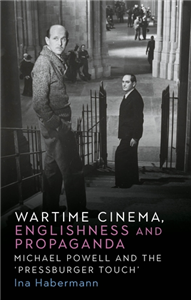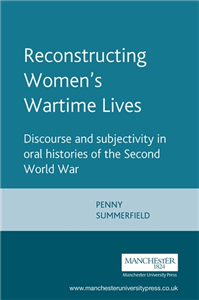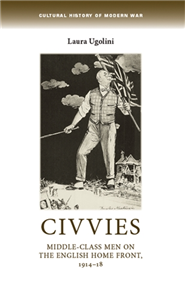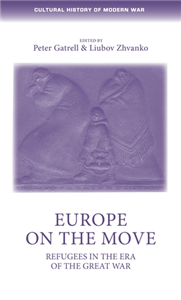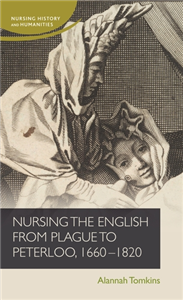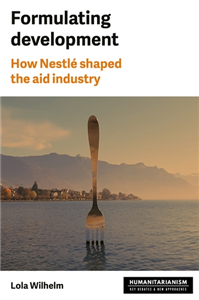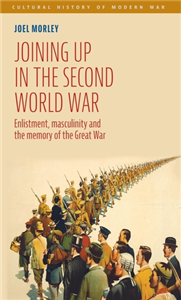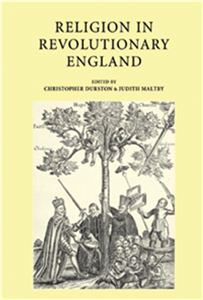Your Search Results
-
International Monetary Fund
IMF’s print and digital publications present the research, policy advice, and data on economic and financial sector issues at the global, regional, and country levels.
View Rights Portal
-
Promoted ContentThe ArtsSeptember 2025
Wartime cinema, Englishness and propaganda
Michael Powell and the ‘Pressburger Touch’
by Ina Habermann
This book provides a fresh analysis of the wartime work of Michael Powell and Emeric Pressburger and their team 'the Archers'. It argues that in their earlier work, Powell and Pressburger should be seen as middlebrow storytellers whose stories explore national identity in times of war. Their wartime work is discussed in four phases: While the first phase covers their contributions to the 'phoney war', the second traces their engagement with the 'people's war'. The third phase sees the Archers move beyond propaganda, towards memodramas of Englishness, cross-cultural alliances and quests for spiritual modernity. The fourth phase dramatizes post-war preoccupations with an increasing focus on memory and trauma. Following up these thematic concerns, the conclusion is devoted to Pressburger's later work, including his two published novels Killing a Mouse on Sunday and The Glass Pearls.
-
Promoted ContentHumanities & Social SciencesAugust 1998
Reconstructing Women's Wartime Lives
Discourse and subjectivity in oral histories of the Second World War
by Penny Summerfield
Examines the effects of the Second World War on women's sense of themselves. Using oral history it explores the interaction between cultural representations of men and women in the war, and women's own narratives of their wartime lives. ;
-
 Trusted Partner
History of medicineFebruary 2015
Trusted Partner
History of medicineFebruary 2015One hundred years of wartime nursing practices, 1854–1953
by Edited by Jane Brooks and Christine Hallett
-
 Trusted Partner
Humanities & Social SciencesJune 2016
Trusted Partner
Humanities & Social SciencesJune 2016Cinemas and cinemagoing in wartime Britain, 1939–45
by Richard Farmer, Jeffrey Richards
-
 Trusted Partner
Humanities & Social SciencesSeptember 2013
Trusted Partner
Humanities & Social SciencesSeptember 2013Civvies
Middle–class men on the English Home Front, 1914–18
by Laura Ugolini, Bertrand Taithe, Penny Summerfield, Peter Gatrell, Max Jones, Ana Carden-Coyne
The history of the First World War continues to attract enormous interest. However, most attention remains concentrated on combatants, creating a misleading picture of wartime Britain: one might be forgiven for assuming that by 1918, the country had become virtually denuded of civilian men and particularly of middle-class men who - or so it seems - volunteered en masse in the early months of war. In fact, the majority of middle-class (and other) men did not enlist, but we still know little about their wartime experiences. Civvies thus takes a different approach to the history of the war and focuses on those middle-class English men who did not join up, not because of moral objections to war, but for other (much more common) reasons, notably age, family responsibilities or physical unfitness. In particular, Civvies questions whether, if serviceman were the apex of manliness, were middle-class civilian men inevitably condemned to second-class, 'unmanly' status? ;
-
 Trusted Partner
Humanities & Social SciencesJanuary 2019
Trusted Partner
Humanities & Social SciencesJanuary 2019Cinema and Radio in Britain and America, 1920–60
by Jeffrey Richards
-
 Trusted Partner
The ArtsApril 2010
Trusted Partner
The ArtsApril 2010Humphrey Jennings
by Keith Beattie, Brian McFarlane, Neil Sinyard
Humphrey Jennings has been described as the only real poet that British cinema has produced. His documentary films are remarkable records of Britain at peace and war, and his range of representational approaches transcended accepted notions of wartime propaganda and revised the strict codes of British documentary film of the 1930s and 1940s. Poet, propagandist, surrealist and documentary filmmaker - Jennings' work embodies an outstanding mix of startling apprehension, personal expression and representational innovation. This book carefully examines and expertly explains the central components of Jennings' most significant films, and considers the relevance of his filmmaking to British cinema and contemporary experience. Films analysed include Spare Time, Words for Battle, Listen to Britain, Fires Were Started, The Silent Village, A Diary for Timothy and Family Portrait. ;
-
 Trusted Partner
The ArtsMay 2004
Trusted Partner
The ArtsMay 2004The memory of catastrophe
by Peter Gray, Kendrick Oliver
Investigates the dynamic relationship between experiences of profound social and cultural disruption, and human memory. Critical comparisons are made across a wide variety of catastrophic experiences and memories; not just of war, but also of massacre, genocide, rebellion, famine, partition, shipwreck and fire. The book is an accessible showcase for a wide range of methodological approaches to the study of memory, including literary studies, cultural studies, participant-observation and historical studies, and uses a variety of oral, visual and written sources. Offers a diverse chronological and geographical range of catastrophic cases, from seventeenth-century England to the recent conflicts in the former Yugoslavia, from Ireland to the Indian sub-continent, from Mexico to wartime Leningrad. Well-written and accessible - a fascinating read. ;
-
 Trusted Partner
Humanities & Social SciencesJune 2019
Trusted Partner
Humanities & Social SciencesJune 2019Europe on the move
Refugees in the era of the Great War
by Peter Gatrell, Liubov Zhvanko, Penny Summerfield
Mass population displacement affected millions of Europe's civilians across the different theatres of war in 1914-18. At the end of the war, a senior Red Cross official wrote 'there were refugees everywhere. It was as if the entire world had to move or was waiting to move'. Europe on the move is the first attempt to understand their experiences as a whole and to establish the political, social and cultural significance and ramifications of the wartime refugee crisis. Drawing on original research by leading specialists from more than a dozen countries, it will become the definitive work on the subject and will appeal to anyone who wishes to understand how governments and public opinion responded to refugees a century ago.
-
 Trusted Partner
MedicineJanuary 2025
Trusted Partner
MedicineJanuary 2025Nursing the English from plague to Peterloo, 1665-1820
by Alannah Tomkins
This book studies the negative stereotypes around the women who worked as sick nurses in this period and contrasts them with the lived experience of both domestic and institutional nursing staff. Furthermore, it integrates nursing by men into the broader history of care as a constant if little-recognised presence. It finds that women and men undertook caring work to the best of their ability, and often performed well, despite multiple threats to nurse reputations on the grounds of gender norms and social status. Chapters consider nursing in the home, in general hospitals, in specialist institutions like the Royal Chelsea Hospital and asylums, plus during wartime, illuminated by multiple accounts of individual nurses. In these settings, it employs the sociological concept of 'dirty work' to contextualise the challenges to nurses and nursing identities.
-
 Trusted Partner
Humanities & Social SciencesJuly 2025
Trusted Partner
Humanities & Social SciencesJuly 2025Formulating development
How Nestlé shaped the aid industry
by Lola Wilhelm
In the 1970s, Nestlé became a lightning rod for criticism against the food industry's negative impacts on humans and their environment, especially in the Global South. But what has so far eluded historical scrutiny is that the picture was more nuanced. This book tells the exclusive story of how the Swiss food giant, and more broadly corporate capitalism, have shaped the aid industry since the late nineteenth century. It follows Nestlé's bid for a share of the humanitarian market brokered by the Red Cross in wartime Europe, of its clinical trials in Swiss and Senegalese maternities, and of its agricultural modernisation schemes in Mexico, India, and the Ivory Coast. Based on extensive research in the firm's own historical archives and the records of national and international aid agencies, the volume interrogates the legacies of this long history for international development today.
-
 Trusted Partner
Humanities & Social SciencesJuly 2025
Trusted Partner
Humanities & Social SciencesJuly 2025Joining up in the Second World War
Enlistment, masculinity and the memory of the Great War
by Joel Morley
This book connects the First and Second World Wars. It uses oral histories and Mass Observation material to explore men's attitudes to Second World War enlistment and the relationship they perceived between military service and masculinity, and how these were influenced by understandings of the First World War. Locating the cultural legacy of First World War in the subjectivities of men who participated in the Second World War demonstrates the breadth of sources that informed men's understandings of the First World War in interwar Britain. Its cultural legacy was omnipresent and diverse, and informed young men's attitudes and service preferences, but it reinforced Edwardian conceptions of wartime masculinity as often as it undermined them. Two decades after the First World War ended, they remained resilient in the subjective understandings of men who grew up in the Great War's shadow.
-
 Trusted Partner
The ArtsApril 2011
Trusted Partner
The ArtsApril 2011Anthony Asquith
by Tom Ryall, Brian McFarlane, Neil Sinyard
This is the first comprehensive critical study of Anthony Asquith. Ryall sets the director's work in the context of British cinema from the silent period to the 1960s, examining the artistic and cultural influences which shaped his films. Asquith's silent films were compared favourably to those of his eminent contemporary Alfred Hitchcock, but his career faltered during the 1930s. However, the success of Pygmalion (1938) and French Without Tears (1939), based on plays by George Bernard Shaw and Terence Rattigan, together with his significant contributions to wartime British cinema, re-established him as a leading British film maker. Asquith's post-war career includes several pictures in collaboration with Terence Rattigan, and the definitive adaptation of Oscar Wilde's The Importance of Being Earnest (1951), but his versatility is demonstrated in a number of modest genre films including The Woman in Question (1950), The Young Lovers (1954) and Orders to Kill (1958). ;
-
 Trusted Partner
January 1996
Trusted Partner
January 1996Der Zug war pünktlich
by Böll, Heinrich / Nachwort von Böll, Viktor; Nachwort von Busse, Karl H
Heinrich Böll’s taut and haunting first novel tells the story of twenty-four-year-old Private Andreas as he journeys on a troop train across the German countryside to the Eastern front. Trapped, he knows that Hitler has already lost the war ... yet he is suddenly galvanized by the thought that he is on the way to his death. As the train hurtles on, he riffs through prayers and memories, talks with other soldiers about what they’ve been through, and gazes desperately out the window at his country racing away. With mounting suspense, Andreas is gripped by one thought over all: Is there a way to defy his fate? Nowhere in Böll’s work is there a more powerful statement of his core theme than in this tense and moving ode to the fate of the common man in wartime.
-
 Trusted Partner
20th century history: c 1900 to c 2000October 2013
Trusted Partner
20th century history: c 1900 to c 2000October 2013Northern Ireland in the Second World War
Politics, economic mobilisation and society, 1939–45
by Philip Ollerenshaw
This original and distinctive book surveys the political, economic and social history of Northern Ireland in the Second World War. Since its creation in 1920, Northern Ireland has been a deeply divided society and the book explores these divisions before and during the war. It examines rearmament, the relatively slow wartime mobilisation, the 1941 Blitz, labour and industrial relations, politics and social policy. Northern Ireland was the only part of the UK with a devolved government and no military conscription during the war. The absence of military conscription made the process of mobilisation, and the experience of men and women, very different from that in Britain. The book's conclusion considers how the government faced the domestic and international challenges of the postwar world. This study draws on a wide range of primary sources and will appeal to those interested in modern Irish and British history and in the Second World War.
-
 Trusted Partner
The ArtsSeptember 2013
Trusted Partner
The ArtsSeptember 2013Launder and Gilliat
by Bruce Babington, Brian McFarlane, Neil Sinyard
Bruce Babington analyses the achievement of one of the central partnerships in British film history, the screenwriters of famous films by Hitchcock and Carol Reed, who became the producer-writer-directors of a succession of famous and well-loved films including Millions Like Us, Two Thousand Women, Waterloo Road, The Rake's Progress, I See a Dark Stranger, The Blue Lagoon and The Happiest Days of Your Life. This study of the pair is notable both for its contextualising of them within English and British culture over four decades, including British cinema's 'golden age' of the war and immediate post-war years, and for its close reading of films that have been critically neglected, despite their popularity. Scholarly but not pedantic, the book shows its subjects to be not ordinary mainstream practitioners but deceptively serious filmmakers registering the 'ideological weather' of wartime and post-war Britain in engaging and creative ways. ;
-
 Trusted Partner
Humanities & Social SciencesJune 2025
Trusted Partner
Humanities & Social SciencesJune 2025Humanitarianism and the Greater War, 1914–24
by Elisabeth Piller, Neville Wylie
-
 Trusted Partner
Literature & Literary StudiesDecember 1991
Trusted Partner
Literature & Literary StudiesDecember 1991Réquiem por un Campesino Español
by Ramon J. Sender, Patricia McDermott
"equiem per un campesino espanol" was first published under the title Mosen Millan in Coleccion Aquelarre,Mexico, 1953. The present text follows the first Spanish edition published by Destino, Barcelona, 1974, which bears a few minor variants, mainly in paragraph structure. It has been reprinted a number of times and translated into many languages and is one of the most widely read Spanish texts in the 20th century. This edition is aimed primarily at sixth-formers and university undergraduates and the introduction and notes have been compiled in the light of recent socio-politial topic-based syllabuses and communication studies courses. The inclusion in the introduction of a substantial section on the now out-of-print "Contraataque" (1937), the wartime narrative which contains the germ of the post-war novel, is intended to provide the student with a context for the study of the process in Sender's writing inspired by the Civil War - from explicit militant propaganda penned in the heat of battle to implicit poetic parable, historical emotion recollected in the comparative tranquillity and distance of exile. It is hoped that such a juxtaposition will illuminate both the content and literary achievement of "Requiem". ;
-
 Trusted Partner
FictionSeptember 2017
Trusted Partner
FictionSeptember 2017A Vision of Battlements
by Anthony Burgess
by Andrew Biswell, Paul Wake
A Vision of Battlements is the first novel by the writer and composer Anthony Burgess, who was born in Manchester in 1917. Set in Gibraltar during the Second World War, the book follows the fortunes of Richard Ennis, an army sergeant and incipient composer who dreams of composing great music and building a new cultural world after the end of the war. Following the example of his literary hero, James Joyce, Burgess takes the structure of his book from Virgil's Aeneid. The result is, like Joyce's Ulysses, a comic rewriting of a classical epic, whose critique of the Army and the postwar settlement is sharp and assured. The Irwell Edition is the first publication of Burgess's forgotten masterpiece since 1965. This new edition includes an introduction and notes by Andrew Biswell, author of a prize-winning biography of Anthony Burgess.
-
 Trusted Partner
Humanities & Social SciencesJanuary 2007
Trusted Partner
Humanities & Social SciencesJanuary 2007Religion in Revolutionary England
by Christopher Durston, Judith Maltby
This book offers a collection of essays tightly focused around the issue of religion in England between 1640 and 1660, a time of upheaval and civil war in England. Edited by well-known scholars of the subject, topics include the toleration controversy, women's theological writing, observance of the Lord's Day and prayer books. To aid understanding, the essays are divided into three sections examining theology in revolutionary England, inside and outside the revolutionary National Church and local impacts of religious revolution. Carefully and thoughtfully presented, this book will be of great use for those seeking to better understand the practices and patterns of religious life in England in this important and fascinating period. ;




